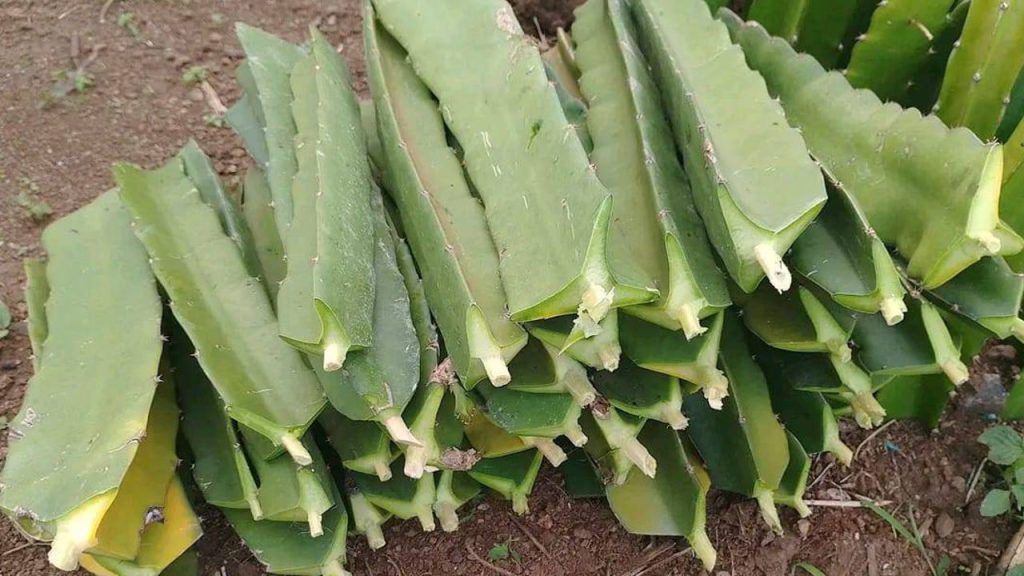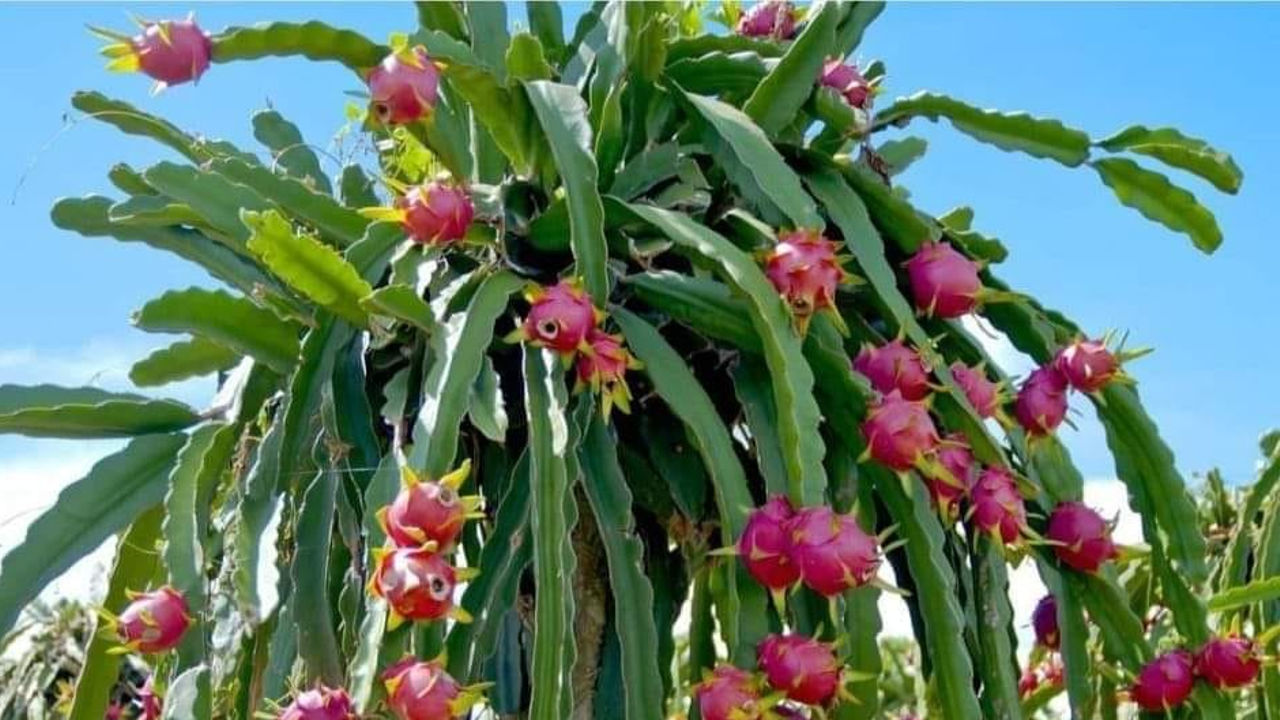Dragon Fruit farming in Kenya is the biggest trending farming business idea for 2024. Still, every time I hear about a trending business idea in Kenya, I become a bit skeptical, reading through the lines. I’ve learned to question everything. In the past, my hesitance to plunge into opportunities fast has placed me on the losing side of valuable opportunities. The Dragon fruit trend in Kenya is one of them.
What is a Dragon Fruit, and Why is It Trending?
Dragon Fruit is a tropical fruit. It’s actually a type of cactus scientifically known as the Hylocereus cactus or, more commonly, the Honolulu Queen, Pitahaya, or Strawberry Pear. Although it can be found and grown in Kenya and all over Africa, it originated in South America and Mexico.
According to nutritionists, it’s high in fiber and also rich in antioxidants. If you’ve had the privilege of tasting this amazing fruit, it has the aroma and taste of a pear fruit, and for that, it makes for a very refreshing fruit on a hot sunny day.
Other than its unique taste, nutritionists say, it offers a multitude of health benefits.
Health Benefits of the Dragon Fruit
If you are a health buff, you’ll be glad that Dragon Fruit has a wide variety of nutrients perfect for human body chemistry. It contains several nutrients in small quantities and is also a good source of fiber, iron, and magnesium.
For every 100 grams of Dragon fruit you consume, there are 57 grams of calories, 0.14 grams of fat, 15 grams of carbs, 3 grams of fiber, Vitamin C (5% of the DV), Magnesium (2% of the DV), Iron (1% of the DV).
Dragon fruit also contains several antioxidants, which are important for protecting cells from free radicals (unstable molecules). These antioxidants include Betalains, Flavonoids, and Hydroxycinnamates.
The nutrient content, as well as studies done on Mice, reveal that this tropical fruit could indeed have potential health benefits for humans, Including:
- Weight loss
- A good addition to diet plans for Type 2 Diabetes patients
- Good for metabolic health
Is There a Market For Dragon Fruit in Kenya?
They say doing business involves taking risks, and there’s always a high chance you’ll get bruised. I appreciate that line of thought, and for that reason, I am not a businessman—I’m better at analyzing trends and reading between the lines. And this Dragon fruit farming business in Kenya is more than what meets the eye.
Please don’t get me wrong. Dragon Fruit farming in Kenya could be profitable. If people are talking about it, then there’s definitely some money to be made. But as an opportunistic businessperson, you need to do your due diligence and find out where the money is being made. Who’s cashing in most out of the Dragon Fruit business—that’s where your hard-earned money needs to be invested.
I’ve discussed this a lot of times with my friends and family. Kenyans, and probably the world over, love to take advantage of hardworking people, and in this case, it’s the farmers. They put in all the work, and at the end of the day, they get pennies compared to what the middlemen and higher-ups take home. It’s infuriating, but unfortunately, it’s the cycle of business.
To answer the question: Is there a market for Dragon Fruit in Kenya? Yes, we are selling seedlings. While Kenyans are becoming increasingly health-conscious, not too many are buying the fruit for its health benefits yet.
Case Studies of Popular Farming Trends With Hidden Profits Within The Chains
Over the weekend, a good friend sent me a screenshot of a discussion in a popular Kenya Farmers Group on Facebook, Digital Farmers Kenya. I could relate to the OP’s (Original Poster) sentiments about the hype surrounding the trending Dragon Fruit farming business in Kenya.
The topic poster, Gabriel Litunya Akali, on Facebook, was furious about the Dragon Fruit farming trend in Kenya, and for one reason – he felt it wasn’t sustainable. “ I am again asking why a seedling from a cactus family called dragon is going for more than KES 100 in Kenya. This kind of feasting on farmers MUST be brought down,” he vented.
He’s right. Gabriel, like me and other people tagged the name ‘Paranoid,’ can see something isn’t really right. This Dragon Fruit farming trend in Kenya has a script that runs like many others we have seen before—and for that reason, I had to take a walk down memory lane analyzing the trend.
Case Study One: Quail Egg Farming In Kenya Trend
If you are old enough, you remember the Quail egg trend that took the farming and business world by storm in Kenya over a decade ago. Well, this Dragon Fruit trend in Kenya sounds much like the Quail trend turned scandal. The following are a couple of similarities between these two trends:
- Offer miraculous health benefits for patients with terminal illnesses (respiratory, cancer, diabetes).
- The end product has no market (If you and I are not looking to buy this product, who is?).
- Boost Sexuality.
- With sudden urgency, the product has become insatiable in the market, and you need to invest now.
- High initial investment (Dragon Fruit Seedlings retailing for KES 1,000 a pop), for Quail Eggs, the chicks were also quite pricey.
So, in the end, farmers rushed to buy the chicks, while the profitable product here was, in fact, the eggs. But here’s the kicker. For those who have done business or marketing, the Quail eggs trend in Kenya was a B2B model and not a B2C.
Simply put, those who invested in the business hoping to make returns from the end-user (the person who consumes or eats the eggs) terribly failed. The biggest winners were those who bought the eggs or chicks, hoping to sell them to farmers looking to invest in the fad.
Case Study Two: Green House Farming
I know I’ll get a lot of slack for this, but I believe greenhouse farming was, and still is, the biggest farming scandal in Kenya. It’s actually not really a scandal but a misconception. The business of Green Houses is not for the end product – Onions, Tomatoes, Capsicum, or whatever else you plan on planting there. The Product here is the greenhouse structure itself.
Those who make money out of Greenhouses are those who sell Them, not those who plan to plant onions inside. This is with the exception of farmers looking to go large-scale. It’s a proven fact that large-scale greenhouse projects are profitable, but small-scale projects are not so profitable.
However, setting up one of two greenhouses on a quarter-acre piece of land might not be a profitable venture if you factor in the initial cost of the structure and the labor involved—breaking even takes a lifetime.
Why The Dragon Fruit Is Not the Product

If you are a good businessperson, you’ve already understood where I am going with this information. I’ll make it simple for those who haven’t caught on. The Dragon Fruit farming business in Kenya is a seedling business.
A wise man once said, follow the money – and if one seedling truly costs KES 1,000, then that’s the product you should be selling. But that’s not what will hurt farmers about this entire trend. What I am going to say next will pinch the most.
Many farmers (I included) might think of getting into this venture to sell the fruits to the market. However, what they don’t know is that ‘the farmer’ here is the target market. Before you know it, you won’t have a market to sell your product after growing it for several months and tending to the plants with fertilizers, labor, and other out-of-pocket expenses.
As Gabriel Litunya put it, the entire Dragon fruit farming business in Kenya might be a fad to sell seedlings and not benefit farmers in the long run. He puts out two sane points that I 100% agree with.
Firstly, the Dragon Fruit trend in Kenya is about selling seedlings. Secondly, the price of the seedlings doesn’t make sense, considering the effort required to tend to them is minimal. It’s a cactus, after all—it doesn’t require a lot of input to grow.
The last thing he might have forgotten to add was, who is buying these Dragon Fruits? And for how long will it continue? I know for a fact that I have some oranges, sweet bananas, and avocados in my kitchen—but not a Dragon fruit.
What do you think about this opinion piece? Please share your thoughts on the dragon fruit farming trend in Kenya. We will include your sentiments in ‘Part Two,’ which is part of this piece.
